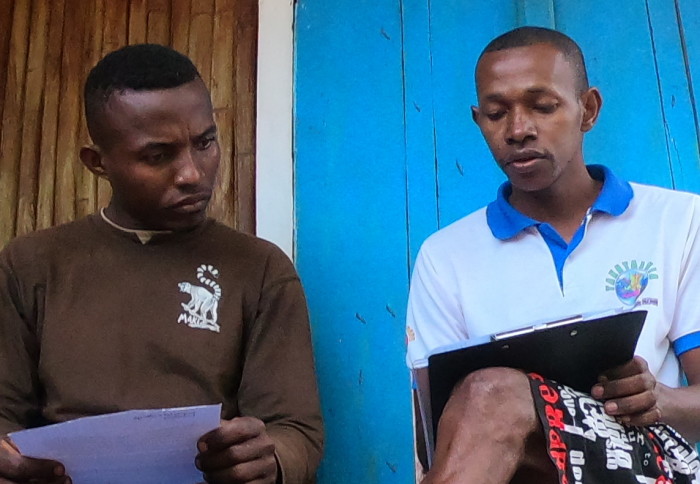Selfless values help motivate nature conservation
by Simon Levey

Survey underway in Malagasy village (Hope Beatty)
A desire to protect nature for future generations is the surprise finding for researchers studying why communities took up conservation projects.
While more than $20 billion per year is spent on projects designed to reverse declining biodiversity or conserve landscapes affected by climate change and other threats from human activities, more still needs to be done to meet the environmental challenges of today and tomorrow.
"Despite a high dependency on the sea for food and income, the fishers studied chose to temporarily close their fishing areas to allow the marine life to recover, primarily for the benefit to future generations. Emily Lewis-Brown study author
To encourage people to take up conservation initiatives - from setting aside land for wildlife in the United Kingdom to rejuvenating fishing grounds along richly biodiverse tropical coastlines - organisations commonly focus on self-enhancing incentives, such as improving status or expected financial rewards.
However, researchers from Imperial College London, plus academic and charity collaborators in Madagascar, the UK and United States, have published new research that identified selfless values as more important than self-enhancing values.
The team of researchers surveyed subsistence fishers in Madagascar who had agreed to periodically stop all fishing to help wildlife recover as part of a marine conservation initiative called Locally Managed Marine Areas (LMMAs).
Emily Lewis-Brown, a research postgraduate in the Science and Solutions for a Changing Planet DTP at Imperial College London, and lead author of the study, said: "Despite a high dependency on the sea for food and income, the fishers studied chose to temporarily close their fishing areas to allow the marine life to recover, primarily for the benefit to future generations."

Ando Rabearisoa from Conservation International and University of California Santa Cruz, and a co-author of the study, said: "Conserving marine wildlife for the benefit of future generations reflects Malagasy culture which considers providing for future generations as the essence of living a moral and meaningful life."
Unexpectedly for the researchers, the fishers' top concern about LMMAs was conflict within and between villages. Some respondents expressed a wish for the livestock that were given to villages engaging in the conservation initiatives studied to be shared in a locally accepted and equitable way across all members of the community, not just fishers.
Understanding the context in Madagascar
Madagascar is one of the world's poorest nations, with declining wellbeing fuelled by political unrest and climate shocks. The island's population is increasing rapidly, particularly along the coast where many people rely on the sea for food and income. However, fishing grounds are becoming damaged and depleted by many factors, including climate change. Since 1998, many communities have been encouraged to establish LMMAs, to help the hunted wildlife and other marine life recover.

LMMAs are agreements within or between villages to restore and sustainably manage shared traditional fishing grounds, which usually includes temporarily stopping fishing there, alongside other measures to preserve and restore marine life. Villages are often offered livestock - which may be highly valued for food, income, status, manure and labour - to help them establish LMMAs.
The research can inform the design of future conservation initiatives
These findings highlight the necessity of working with, and being led by, local people to understand their relationships, values and culture, in designing conservation projects that are viewed locally as fair, and therefore can better serve global nature conservation efforts. The research is consistent with previous academic literature that calls for a code of conduct in conservation to ‘do no harm’ and UN recommendations that conservation initiatives provide locally appropriate social protection measures, particularly supporting vulnerable people.
The study has been published in the journal Conservation, Science and Practice and is a collaboration between Imperial College London, the universities of California Santa Cruz, Madagascar and Oxford, and the charities Conservation International and Blue Ventures. It is part of a wider project by NGOs and universities to understand the establishment, sustainability and scaling of community-based conservation called the Alliance of Conservation Evidence.
-
Article supporters
Article text (excluding photos or graphics) © Imperial College London.
Photos and graphics subject to third party copyright used with permission or © Imperial College London.
Reporter
Simon Levey
Communications Division